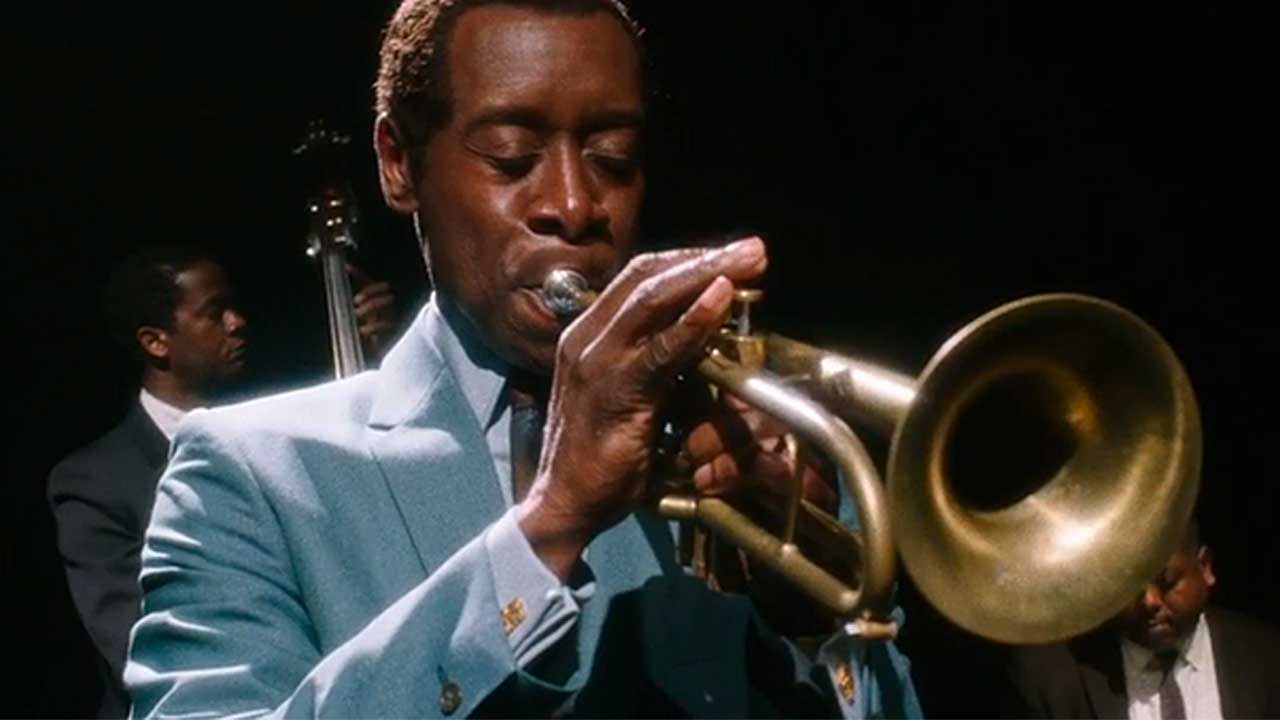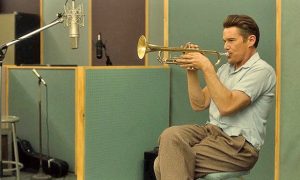
• Miles Ahead, starring Don Cheadle and Ewan McGregor, directed by Don Cheadle, produced by Don Cheadle, Mark Amin, Steven Baigleman, Robert Ogden Barnum, Pamela Hirsch, et al.
• Born to be Blue, starring Ethan Hawke and Carmen Ejogo, directed by Robert Budreau, produced by Robert Budreau, Leonard Farlinger, Jennifer Jonas, and Jake Seal
• • •
Existing almost exclusively in the jazz world provides for an interesting existence. People’s perceptions about what you “do” creates interesting conversations and constant explaining to people that give you blank stares punctuated with an equally blank nod of the head. What is jazz, anyway? As it turns out, not a lot of people know, yet it is my job to find creative ways to teach people about the music. In my line of work, we are always trying to find ways of relating the abstract (jazz) with the common, which tends to be something more palatable or mainstream like baseball, fashion, or in this case, film. The latter provides fertile ground for parallels with jazz, or in this case, the telling of stories that focus on jazz musicians. After all, who does not like a good movie?
The spring of 2016 was unique in that two movies focusing on jazz were released: Born to Be Blue, featuring Ethan Hawke as the pretty-boy, West Coast jazz icon Chet Baker and Miles Ahead, which features Don Cheadle as trumpet legend, Miles Davis. Both are great movies for different reasons.
The fact that Miles Ahead is almost entirely fictional has been a major point of contention in the jazz community since its release. The film examines a point in Davis’s life where he had quit playing (roughly 1975-1980) for no other reason than he felt like he had said everything he had to say.[i] This is true, but the events portrayed in the film surrounding Davis and journalist David Brill, played by Ewan McGregor, as they chase down a stolen tape of Davis’s music are fictional; yes, the car-chase gun battle did not happen. Interestingly, Cheadle said in a Rolling Stones interview that McGregor’s character was essentially created in order to get the movie financed, and that “… until Ewan came on, until we had cast the proper white co-star, there was no Miles Davis movie.” A revelation about the power of the almighty dollar and race in the entertainment industry.
Historical embellishments aside (and there are a lot of them, as is typical in most biopics), the movie is entertaining and well done, staying true to Davis’s opening line of “if you’re gonna tell a story, come at it with some attitude. Don’t be all corny with this sh—t.” As a musician, the many flashbacks are of note because they are shot in a way that takes into account Davis’s aesthetic; the movie felt and looked like Miles Davis. From the graininess of the film, the colors, and Davis’s notable fashion sense, Cheadle does a good job incorporating these elements of persona in a way that adds to the film’s overall effectiveness in portraying the man that was Miles Davis. On August 25, 1959, when Davis was beaten by a cop outside of Birdland (the famous jazz club in New York, named after Charlie Parker) for speaking on very friendly terms with a white female fan, I found myself looking at the blood spatters on his white sport jacket to see if they matched those in the pictures taken after the actual incident that happened in 1959. I did not investigate beyond the casual thought.
… Miles’s life was so multi-faceted that it probably would not make for a great biopic in the traditional sense. This is a point that Don Cheadle does not try and push aside. His goal was not to make a movie about Davis’s life, but to make a movie that Davis would have wanted to be in.
Now, I understand why many in the jazz community were disappointed from the outset. I admit that when first saw the trailer, I was taken aback as I saw Davis, leaning out of a car, shooting a gun at the vehicle behind him as both cars squealed down the streets of New York. Many strong opinions were shared on social media, as well as in the press, and I can not say that I blame them. After all, Davis was such an iconic figure that his life and work should be able to stand on its own and without sensationalism. On the other hand, Miles’s life was so multi-faceted that it probably would not make for a great biopic in the traditional sense. This is a point that Don Cheadle does not try and push aside. His goal was not to make a movie about Davis’s life, but to make a movie that Davis would have wanted to be in. Davis’s persona and mystique is something that Davis enjoyed, but he energetically cultivated. Whether any of it was part of some elaborate act is beside the point because the fact is that Davis had a certain aesthetic and way he wanted people to see him. In this, the film was successful. Sure, many of the main plot points were made up, but Cheadle’s portrayal of Davis was convincing in the sense that if the story had been true, it would have been completely believable. If pushed to it, I bet Davis would have shot at someone to get back his music. A true telling of Davis’s life is probably better set for a Ken Burns documentary than it is for the silver screen.
 Born to Be Blue, on the other hand, takes a different approach, in that the overall plot and most of the events related to the viewer are true. The film examines the year 1966, where Chet Baker lost most of his front teeth in a fight with a drug dealer, rendering him unable to play. As a result he is fitted for dentures and moves back to his parents’ home in Oklahoma, where he takes odd jobs (one of them pumping gas) and re-learns how to play. At this point in his career, he is largely broke and can not get any of his old record company friends to take a chance with him on another record (a result of many burned bridges due to heroin use). Helping him on his road to recovery is his girlfriend, actress Jane Azuka, a fictional character played by Carmen Ejogo that is likely a composite of many of the women in Baker’s life. In the movie, she is also conveniently a jazz pianist, or enough of one to be able to play in a jam session as the once famous trumpet player works to regain his chops. Baker is finally able to mount a very successful comeback (many think his most significant recordings were made in this period), but in the process also chooses his drug addiction over love.
Born to Be Blue, on the other hand, takes a different approach, in that the overall plot and most of the events related to the viewer are true. The film examines the year 1966, where Chet Baker lost most of his front teeth in a fight with a drug dealer, rendering him unable to play. As a result he is fitted for dentures and moves back to his parents’ home in Oklahoma, where he takes odd jobs (one of them pumping gas) and re-learns how to play. At this point in his career, he is largely broke and can not get any of his old record company friends to take a chance with him on another record (a result of many burned bridges due to heroin use). Helping him on his road to recovery is his girlfriend, actress Jane Azuka, a fictional character played by Carmen Ejogo that is likely a composite of many of the women in Baker’s life. In the movie, she is also conveniently a jazz pianist, or enough of one to be able to play in a jam session as the once famous trumpet player works to regain his chops. Baker is finally able to mount a very successful comeback (many think his most significant recordings were made in this period), but in the process also chooses his drug addiction over love.
Baker’s life was no less interesting than Davis’s, and they share many similarities including drugs, women, and record companies that treat them like cash cows instead of artists. Both began their rise to fame by playing with Charlie Parker, Miles leaving Parker because he could not abide Parker’s antics (Davis referred to Parker as “greedy”), and Baker leaving in part because, well, Parker, a victim of his enormous excesses, left this earth. Born to Be Blue highlighted, on many occasions, Baker’s struggle with wanting to be perceived by his musical peers (Miles Davis and Dizzy Gillespie) as more than a pretty face with a sub-par singing voice that could sell records. After he played with Parker, Baker made up an oft-repeated tale of Parker returning to New York and telling Gillespie and Davis that there was a “little white cat on the coast who’s going to eat you up.”
One famous incident in 1963 tells of Davis approaching Baker between sets at the Blue Note, giving him a salute and saying “Man, you suck.”
Ironically, Baker was heavily influenced by early recordings of Davis, especially the 1949 recordings that eventually became Birth of the Cool. In the movie, Davis even makes an appearance is his comeback concert at Birdland and gives an obviously begrudging nod of approval. This event is fictionalized, but the somewhat contentious relationship between the two is not. One famous incident in 1963 tells of Davis approaching Baker between sets at the Blue Note, giving him a salute and saying “Man, you suck.” A few years later, Baker would grow to resent Davis and other black musicians, claiming he was a victim of reverse racism, being denied gigs and record deals because he was white.
On a broader level, both of these films tell a compelling story of both the sacrifices professional musicians make for their art and the sometimes tragic consequences that result. Many complaints could be lodged about what the movies did and not do, but I prefer to look on the bright side, and that is that in the spring of 2016, two movies were released about two famous jazz trumpet players. Despite the fictionalized aspects of both films, each stayed true to the depiction of who each of these men were, their triumphs and their faults. For our part, the jazz community can either use this as an opportunity to spark conversations that further interest in jazz, or we can sit in the corner like a scorned lover and lament the fact that, Miles Ahead in particular, was not the Second Coming.
